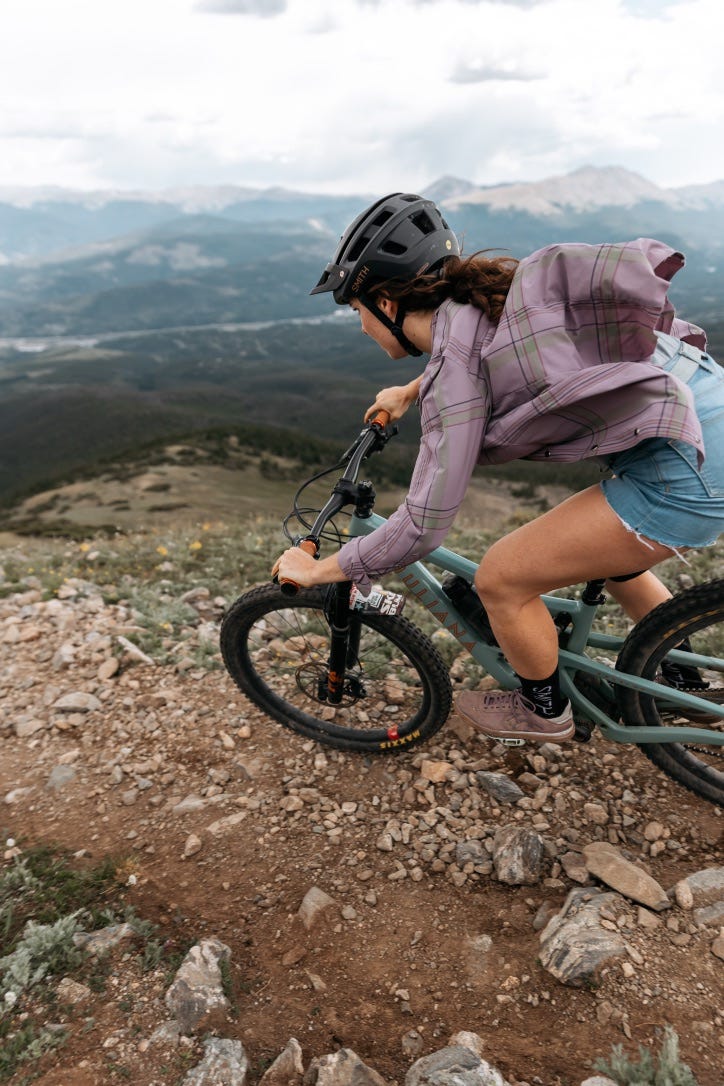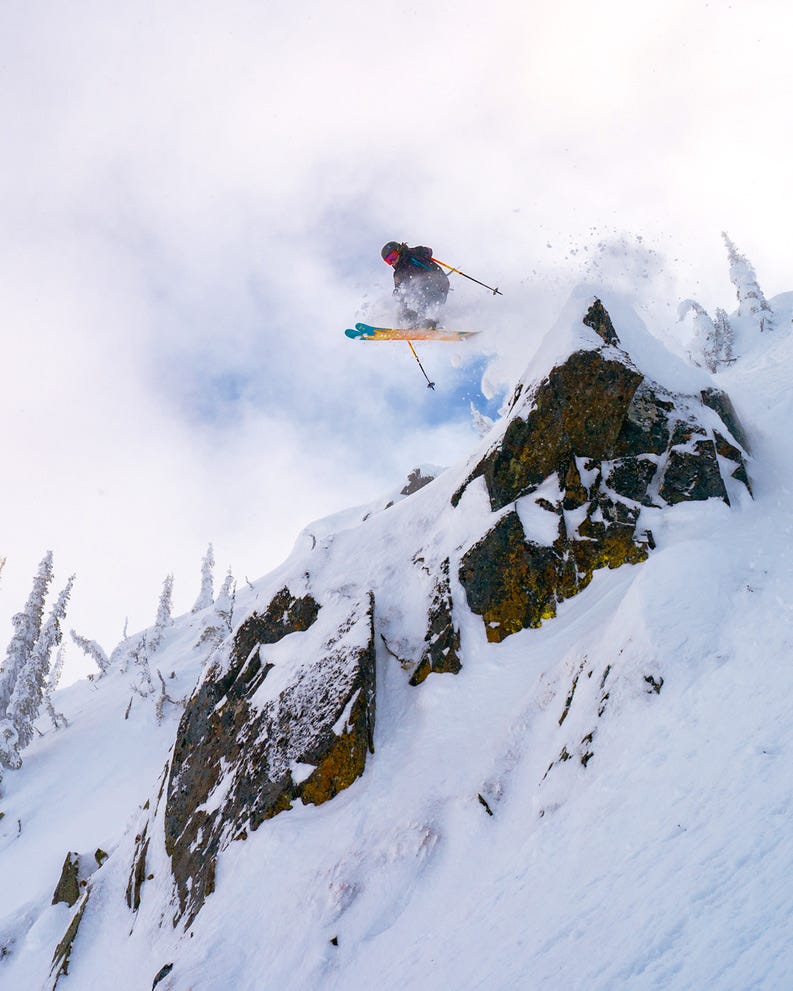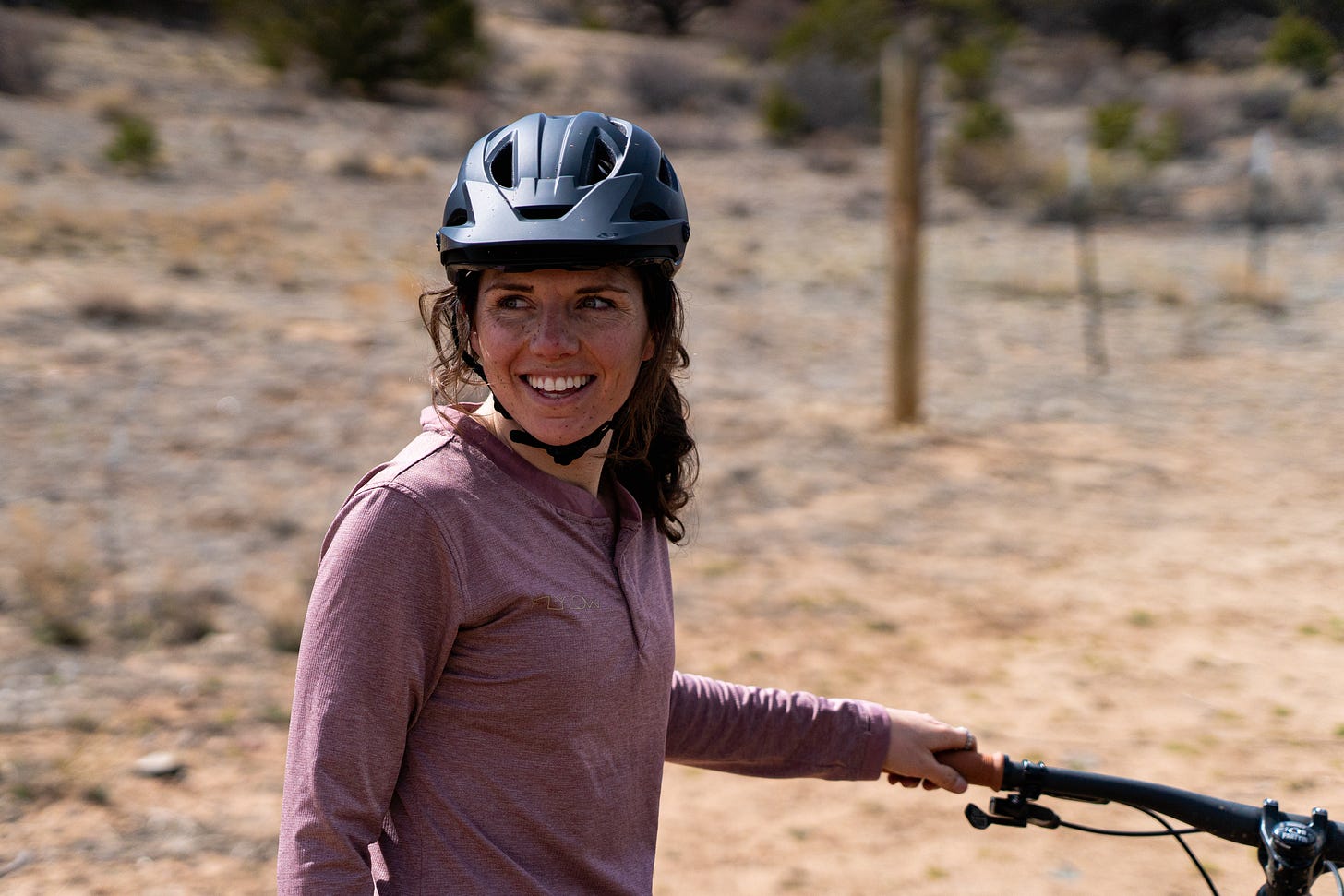From where I sit, Delilah Cupp has it figured out—some of it. She keeps skiing fun. When she’s not skiing, she’s having fun riding bikes. I appreciate that. Del finds joy in the mountains and she is gracious enough to share it with us.
What's the point if we're not having a blast, laughing at ourselves and appreciating the descent? It’s all about being grateful for the joy snow and singletrack brings to us. Delilah understands that part of it.
I’m a new fan and follower of Del’s. A MTB edit piqued my interest. I noticed that David Reddick, Powder’s legendary Directory of Photography, commented on the photo above saying: “I’m just gonna say it…POWDER cover. If only!” Then, Maren Larsen compared Del and her friends to MTV’s Jackass for Outside.
Delilah and I recently caught up. We talked about not taking ourselves too seriously, keeping skiing (and biking) fun, sharing the joy and climate stewardship, among other things.
Below, you’ll find a few questions from our chat that paint a compelling picture of Delilah Cupp. First, check out Girls Gotta Eat Dirt because it’s fucking fantastic!
Greg Fitz (GF): Do you identify as a skier or biker first?
Delilah Cupp (DC): I am definitely a skier first. The reality of it is you can only ski for a couple months out of the year but you can ride bikes almost all the time. I have more days on my bike and I’m getting more comfortable on the bike, but I grew up skiing. I feel like I’ve progressed a lot more in my skiing and I definitely am more comfortable as a skier. I don’t feel as charged up on a bike as I do on skis.
GF: Where’d you grow up skiing? Where’d you plant your roots as a skier?
DC: I grew up in Twisp, Washington, which is a tiny little town in north central Washington. It’s where North Cascade Heli Skiing is based out of, and there have been a lot of TGR segments from around there. I grew up with parents who exclusively backcountry skied; so, I grew up learning how to bomb down our steep driveway and skied in the backcountry a little as really young kid. Eventually, I ended up ski racing at this tiny little hill with only one chairlift called Loup Loup. I got pretty into it and moved to a few ski academies during my youth. I was in California at Sugar Bowl Academy for part of high school. Then I made the US Ski Team Academy Team; so, I moved to Park City for my teenage years and alpine ski raced.
GF: What did you learn from ski racing that you carry with you now?
DC: Ski racing can go so differently for different people. For me, I’m glad that I was on the outside edge of the ski racing world. But, I’m also really glad that it ended when it did because I think ski racing can be a good thing or sometimes ski racing can be less positive for kids’ development. It definitely taught me a lot of discipline, how to work hard at things and how to suffer a bit. The best thing I got from ski racing is that “start gate mentality”—being able to be excited about being nervous. I preform a lot better under pressure than if I were just on my own.
GF: What inspires your approach to skiing and mountain biking?
DC: For me, each sport inspires the other. On my bike, I look at the trail differently and feel the terrain in a different way because of skiing. I always think that skiing makes me a better biker and vice versa. It’s really about who I’m with and where I’m at that inspire me. In skiing, a lot of my inspiration has been the people I’m following on skis—usually those are my older brother and his friends. I’m usually following a bunch of older dudes, basically. They’re out there skiing big lines and throwing big tricks and telling me I can do it, too.
GF: Shifting gears, I heard rumblings about your job at the Governors’ Climate & Forests Task Force. True story?
DC: Yeah. It’s based in Boulder because it is housed within the Colorado University Law School, but all of the work is overseas in Brazil, Mexico, Indonesia and Peru in tropical forests. I worked to advance forest protection policies while at the Governors’ Climate & Forests Task Force by working directly with governments in the tropics.
GF: With your experience, what’s your take on the climate?
DC: It is pretty bleak. There’s a lot of bad news and a lot of bad data. But, mixed in with that there’s some really good news, too! Especially in my job and what I studied in school, I got to see firsthand the small-scale community-level successes that do happen but aren’t in the global news. These things save lives, make people’s lives a lot better and protect indigenous rain forests from getting cut down. It’s easy to look at the big picture and say, “We’re completely fucked. What’s the point?” But, it’s really important to look at the small successes that do add up to be at least a small sum of the parts. I don’t know how to get the everyday person excited and engaged in that, though. I don’t know if that’s really important either. I definitely have fallen into the view that consumer choice doesn’t really make an impact. It’s up to government policy and the big corporations to make the big changes that will make a difference. Then again, it’s up to the individual to inform those policies and force corporations to shift. I definitely don’t have the answer more than anyone does. Anyone who talks or writes about the subject seems to conclude with: “It’s a little bit of this and little bit of that… One informs the other… It’s the feedback loop…” Yes, we’re mostly fucked. But, it’s not entirely too late to have a better future than we could have if we don’t change anything.
GF: Is this your craft? Is stewardship and climate protection your profession?
DC: Yeah. There’s a big challenge to overcome. I would like to think that I can be a part of figuring out that challenge, but it’s hard to know where to start. I plan to go back into that field and to dive back into the work eventually. Working in ski and bike media, thinking about things a little differently and talking to more people outside of the conservation field has made me think that maybe there’s something I can do that has more of an impact than working as an associate at a big international non-profit right now. But, I’m still trying to figure it out.
GF: A fan or follower of yours on social media would never know about this side of you. Is that the point? Is what you’re putting out on social meant to provide a respite for people from everything else?
DC: Almost entirely yes. When my roommates and I were thinking about Girls Gotta Eat Dirt we were trying to think about what makes us unique and trying to find something that people would want to watch in a video. We thought the dichotomy between us all having serious careers at this point in our lives and being able to talk about serious things while also being able to just forget about that stuff and go ride our bikes was pretty significant. We wanted to play up the super fun and playful side to be totally contradictory to the serious side in which we’re trying to make a worldly impact. I want to keep those parts of myself really separate for personal reasons. I don’t feel like I need to put my social, political, cultural views on Instagram. I also get that it could be a good platform for trying to inform some change. At the same time, I feel like my follower base shares a lot of the same opinions as I do already and I don’t really have a unique perspective to add to things that are going on in the world that are important for people to read about.
I’m late to the party, as usual, but it’s definitely a party worth showing up to. It seems like a lot is happening at this exact moment for Delilah Cupp. Edits dropping, editors calling, articles being published, brands reaching out and the wheels are spinning in Del’s orbit. I’m stoked to watch this play out, and I appreciate the energy she brings.










